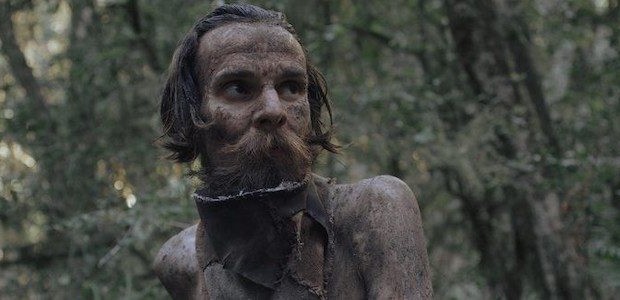It’s a foregone conclusion that we’ll be inundated with COVID-19 media for, at minimum, the next five to ten years. How could we not? It’s the worst pandemic that many of us have seen in our lifetimes; a swath of ongoing death and the growing fanaticism and death cults that come with, seemingly fighting tooth and claw against the scientists and medical professionals who all too often give their lives in the pursuit of an end to it all. Unfortunately, many installments of this new form of media have all the subtlety of a Hummer limousine; fortunately, GAIA is not among them.
Written by Tertius Kapp and directed by Jaco Bower, GAIA combines infection, faith, science, and the madness that comes from spiritualized nihilism into an often horrifying, always breathtaking treatise on the futility of hyper factionalism and the need for the union and understanding of humanity– a tall order of late. It also shares this message, as well as much of the visual and sonic language, with a rather unexpected bedfellow…
GAIA follows a park ranger from the modern world, Gabby (Monique Rockman) and her partner Winston (Anthony Oseyemi) on what should be a routine survey into the deep forests of South Africa, sending them on a collision course with horrific, fungal monstrosities and the father (Carel Nel) and son (Alex Van Dyk) who seem to worship the source of the spores that infect them as their god. When Gabby becomes gravely injured and in danger of full infection herself, she is thrown into almost immediate conflict with the father, Barend, who has indoctrinated his son, Stefan, into an anti-technology and anti-humanist death cult that seeks to spread the infection across what Barend sees as the blight of human kind to bring about a sort of reckoning or rapture. Meanwhile, Gabby seeks to deprogram Stefan, and teach him that the world is not the dark, horrific place that he’s been lead to believe, and instead a place worth seeing, worth saving. What he chooses– what he may gain from the knowledge of both– could be the tipping point for the entire world.
If this sounds similar to the modern COVID factionalism of what is popularly called the anti-intellectual religious death cult vs the scientific community, it should. Much of the rhetoric is the same, and from the two residents of the forest being asymptomatic carriers of the spore parasites to the visuals of the spores themselves twisting and turning through the air like a deadly double-helix, the almost folkloric parallels to our current social environment could not be more certain. It’s something that could hit you over the head fairly hard if done wrong—IN THE EARTH comes to mind— but, through excellent directorial and written choices, GAIA manages to be clear while remaining subtle enough for other interpretations to exist beyond the COVID pandemic.
The visuals and effects work themselves are stunning. The camera twists and turns as much as the spores dance through the air, as disorientating as they are fascinating, and giving an intense sense of claustrophobia even in a wide open environment. The fungal infected as well look brilliant, though the direct comparison needs to be made to where this idea and, for one kind of infected seemingly the entirety of its look and sound, more than likely comes from: the seminal zombie/infected game of our time, THE LAST OF US. For those of you who haven’t played, look up what a clicker enemy looks like, moves like, and sounds like, then watch the film. You’ll see what I mean. It’s pretty blatant and one hopes credit is given in interviews where credit is clearly due.
Speaking of credit being given where credit is due: the main trio of Gabby, Barend, and Stefan all give powerhouse performances, with Nel giving an unhinged, fanatical monologue more than worthy of being seen as an equal to Willem Dafoe’s brilliant turn in THE LIGHTHOUSE. Van Dyk, as well, brings a genuine naivety and growing warmth to Stefan, transforming him through the course of the narrative from a cold, selectively mute acolyte of his father to a gentle, hopeful, and curious young man who is willing to finally come into his own as a human being. It’s such a heartfelt performance, engendering more empathy for Stefan over time than would ever be thought possible from his initial character. Finally, but not least of all, Rockman juggles Gabby’s roles as opposer, protector, surrogate mother, and potential lover with the greatest of ease, each melding into the other with seamless perfection and without either mode outshining the other. It makes the interactions between them all fascinating to watch.
Unfortunately, though what should be the final shot is haunting and humbling, there’s a very unnecessary epilogue scene that– in comparison to the subtlety of the rest of the film– does hit you over the head with one of its main tenets. It takes you out of the moment so quickly, and honestly kills what should have been a deeply emotional and thoughtful moment, instead coming back one more time asking the audience, “Did ya get it? Did ya? You sure?”
GAIA is without a doubt a must-see for 2021, and should put the same existential fear of the forest as JAWS did for the sea and THE SHINING did for isolated spaces in the mountains, but do yourself a favor: after the initial final title card, just stop there. You don’t need the epilogue.
Tags: COVID, environmentalism, Jaws, Jungle, mountains, The Last Of Us, The Lighthouse, the shining


No Comments